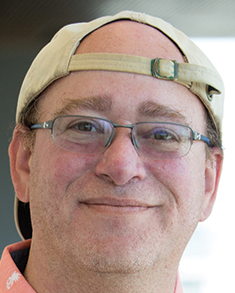Shoichet recognized for informatics tools for drug discovery
, a professor of pharmaceutical chemistry at the University of California, San Francisco, won the . Shoichet works on the development of docking methods and screening libraries and applies these tools in particular to G-protein–coupled receptors.

The Shoichet lab seeks to improve on traditional docking methods with new tricks of the trade. His lab has generated several distinct binding pockets that mimic typical protein cavities with which a promising small molecule could dock. This allows even failed predictions to help in the search for targets that match each small molecule tested.
In addition, the Shoichet lab works with libraries containing millions of small molecules, looking to enhance these libraries with the addition of bio-relevant molecules. This elevates molecular docking projects to the level of traditional high-throughput screening methods.
A key test of these methods has been on GPCRs. The Shoichet lab, in collaboration with of the University of North Carolina, has characterized several orphan GPCRs, including GPR68. This work utilized another aspect of Shoichet’s toolbox, the chemical probe, which identified GRP68’s role in fear-based learning.
In his letter nominating Shoichet, UCSF colleague wrote, “Brian is distinct in that he has extended the reach of computational modeling to study protein-ligand interactions with enormous impact on drug discovery and enzymology.”
As the DeLano Award celebrates the development and dissemination of computational tools, of the University of Dundee noted in his letter of support for Shoichet’s nomination that Shoichet indeed fits the bill. “In the spirit of the ASBMB DeLano Award, Professor Shoichet has made multiple informatics platforms of his research readily accessible to the scientific community to accelerate their own research,” he wrote.
Shoichet earned his bachelor’s degree in chemistry from the Massachusetts Institute of Technology and his Ph.D. in medicinal chemistry from UCSF. After postdoctoral fellowships at UCSF and the University of Oregon, Shoichet held a faculty position at Northwestern University before being recruited back to UCSF.
Shoichet won the PhRMA Foundation Career Award and the National Science Foundation Career Award. He also has served on the scientific advisory board for the National Institutes of Health RoadMap Chemical Libraries and Screening Initiative and the NIH Centers for Biomedical Computing.
Enjoy reading ASBMB Today?
Become a member to receive the print edition four times a year and the digital edition monthly.
Learn moreGet the latest from ASBMB Today
Enter your email address, and we’ll send you a weekly email with recent articles, interviews and more.
Latest in People
People highlights or most popular articles

Meet the 2025 SOC grant awardees
Five science outreach and communication projects received up to $1,000 from ASBMB to promote the understanding of molecular life science.

Unraveling cancer’s spaghetti proteins
MOSAIC scholar Katie Dunleavy investigates how Aurora kinase A shields oncogene c-MYC from degradation, using cutting-edge techniques to uncover new strategies targeting “undruggable” molecules.

How HCMV hijacks host cells — and beyond
Ileana Cristea, an ASBMB Breakthroughs webinar speaker, presented her research on how viruses reprogram cell structure and metabolism to enhance infection and how these mechanisms might link viral infections to cancer and other diseases.

Understanding the lipid link to gene expression in the nucleus
Ray Blind, an ASBMB Breakthroughs speaker, presented his research on how lipids and sugars in the cell nucleus are involved in signaling and gene expression and how these pathways could be targeted to identify therapeutics for diseases like cancer.

In memoriam: William S. Sly
He served on the �鶹��ýɫ��Ƭ and �鶹��ýɫ��Ƭ Biology Council in 2005 and 2006 and was an ASBMB member for 35 years.

ASBMB committees welcome new members
Members joined these committees: Education and Professional Development, Maximizing Access, Meetings, �鶹��ýɫ��Ƭ, Public Affairs Advisory, Science Outreach and Communication, Student Chapters and Women in Biochemistry and �鶹��ýɫ��Ƭ Biology.

